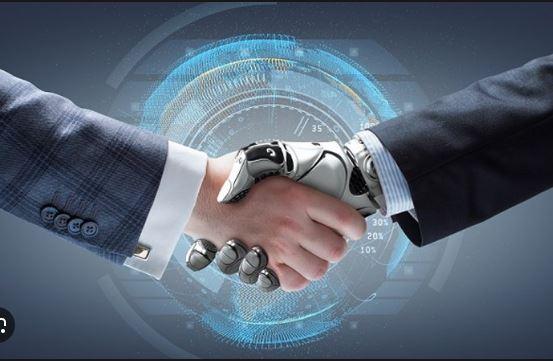The impact of artificial intelligence AI on businesses and industries is undeniable. AI has revolutionized the way businesses operate, from automating mundane tasks to providing insights into customer behavior. AI has enabled businesses to become more efficient, cost-effective, and competitive.
AI has been used to automate mundane tasks such as data entry, customer service, and inventory management. This has allowed businesses to save time and money, as well as reduce the need for manual labor. AI has also been used to improve customer service by providing personalized recommendations and automated responses. AI-powered chatbots can provide customers with quick and accurate answers to their questions, reducing the need for human customer service representatives.
AI has also been used to provide insights into customer behavior. AI-powered analytics can be used to identify customer trends and preferences, allowing businesses to tailor their products and services to better meet customer needs. AI can also be used to identify potential opportunities for growth and expansion.
The Impact of AI on Business and Industries
Artificial Intelligence (AI) has had a significant impact on various business sectors and industries. Its transformative capabilities have revolutionized operations, decision-making processes, customer experiences, and overall business strategies. Here are some key ways AI has influenced different industries:
- Healthcare: AI has enhanced diagnostics, disease detection, and treatment planning. Machine learning algorithms can analyze vast amounts of medical data to identify patterns and predict outcomes. AI-powered systems can assist doctors in diagnosing diseases, recommend personalized treatment plans, and automate administrative tasks, improving efficiency and patient care.
- Finance: AI has revolutionized financial services, enabling more accurate fraud detection, risk assessment, and algorithmic trading. Natural Language Processing (NLP) algorithms can process large volumes of financial data, news, and social media to identify trends, sentiment, and potential investment opportunities.
- Retail: AI has transformed the retail industry by enabling personalized marketing and improving customer experiences. Recommendation systems powered by AI algorithms analyze customer behavior, preferences, and purchase history to provide tailored product suggestions. Chatbots and virtual assistants provide instant customer support, enhancing engagement and reducing costs.
- Manufacturing: AI technologies such as robotics and automation have increased productivity and efficiency in manufacturing processes. AI-powered robots can perform repetitive tasks with precision and accuracy, leading to improved quality control. Predictive maintenance algorithms analyze sensor data to detect equipment failures in advance, reducing downtime and optimizing production schedules.
In Areas like:
- Transportation and Logistics: AI has disrupted the transportation industry through autonomous vehicles, route optimization, and demand forecasting. Self-driving cars and trucks can enhance safety, reduce fuel consumption, and increase delivery efficiency. AI algorithms can optimize logistics operations by analyzing data on weather conditions, traffic patterns, and shipment volumes.
- Marketing and Advertising: AI has revolutionized marketing and advertising by providing data-driven insights and automation capabilities. AI algorithms can analyze consumer behavior, preferences, and demographics to deliver targeted advertising campaigns. Natural language generation (NLG) technology can create personalized content, improving engagement and conversion rates.
- Energy and Utilities: AI has improved energy management, predictive maintenance, and energy grid optimization. Machine learning algorithms analyze energy consumption patterns to optimize power distribution and reduce waste. AI-based predictive maintenance can identify equipment failures in advance, minimizing downtime and optimizing maintenance schedules.
- Agriculture: AI has transformed agriculture by enabling precision farming, crop monitoring, and yield optimization. AI-powered systems analyze satellite imagery, soil data, and weather conditions to optimize irrigation, fertilizer usage, and pest control. This improves crop yield and resource efficiency while reducing environmental impact.
- Human Resources: AI has automated various HR tasks, such as candidate screening, resume parsing, and employee onboarding. AI-powered chatbots can assist employees with inquiries, reducing the burden on HR personnel. Predictive analytics can help identify patterns related to employee turnover and engagement, enabling proactive measures.
Future of AI in Business

The future of AI in business holds immense potential for further transformation and innovation. Here are some key aspects that will shape the future of AI in business:
- Advanced Automation: AI will continue to drive automation across various business processes. Robotic Process Automation (RPA) combined with AI capabilities will enable even more tasks to be automated, increasing efficiency, reducing errors, and freeing up human resources for higher-value activities.
- Enhanced Decision-Making: AI-powered decision support systems will become more sophisticated, providing real-time insights and recommendations to business leaders. Machine learning algorithms will analyze vast amounts of data, identify patterns, and predict outcomes, enabling faster and more informed decision-making.
- Hyper-Personalization: AI will enable businesses to deliver highly personalized experiences to customers. By analyzing vast amounts of customer data, AI algorithms can provide tailored recommendations, offers, and content, enhancing customer engagement and loyalty.
- Natural Language Processing: Advancements in Natural Language Processing (NLP) will enable more sophisticated human-computer interactions. AI-powered chatbots and virtual assistants will become even more conversational and capable of understanding and responding to complex queries and commands.
- Autonomous Systems: AI will continue to drive the development of autonomous systems in various industries. From self-driving cars to unmanned aerial vehicles and robotic manufacturing systems, autonomous technologies will become more prevalent, leading to increased efficiency and safety.
- Augmented Intelligence: AI will augment human capabilities and expertise in the workplace. Rather than replacing humans, AI will work alongside them, providing support in decision-making, data analysis, and repetitive tasks, ultimately enhancing productivity and enabling employees to focus on more creative and strategic aspects of their work.
- Ethical Considerations: As AI becomes more pervasive, businesses will need to address ethical considerations and ensure transparency, fairness, and accountability. Efforts will be made to avoid bias in algorithms, protect data privacy, and establish guidelines for responsible AI use.
- AI-powered Cybersecurity: AI will play a crucial role in cybersecurity, helping to detect and mitigate advanced threats in real-time. AI algorithms can analyze network traffic, identify anomalous behavior, and respond proactively to cyberattacks, strengthening the security posture of businesses.
- Collaboration and Partnerships: As AI technologies continue to evolve, collaboration and partnerships between businesses and AI experts will be crucial. Collaboration will facilitate knowledge sharing, research, and the development of innovative AI solutions tailored to specific industry needs.
The future of AI in business is likely to be marked by further integration, expansion, and refinement of AI technologies across various sectors, empowering businesses to unlock new levels of productivity, efficiency, and customer satisfaction.
Conclusion
Overall, AI has had a profound impact on businesses and industries, driving innovation, improving efficiency, and enabling data-driven decision-making. However, it also presents challenges related to data privacy, ethics, and the need to upskill the workforce to adapt to an AI-driven future.
Finally, AI has been used to improve the security of businesses and industries. AI-powered security systems can detect and respond to threats quickly and accurately, reducing the risk of data breaches and other security threats.
In conclusion, the impact of AI on businesses and industries is undeniable. AI has revolutionized the way businesses operate, from automating mundane tasks to providing insights into customer behavior. AI has enabled businesses to become more efficient, cost-effective, and competitive. As AI continues to evolve, its impact on businesses and industries will only become more pronounced.

Pingback: AI Revolutionizing the Way We Live and Work - WP SEO Digital Hub
Comments are closed.